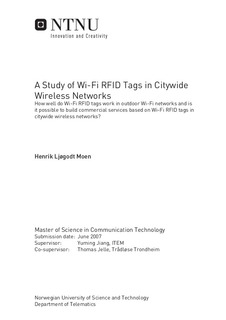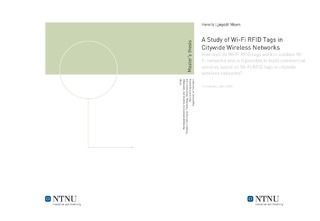| dc.contributor.advisor | Jiang, Yuming | nb_NO |
| dc.contributor.advisor | Jelle, Thomas | nb_NO |
| dc.contributor.author | Moen, Henrik Ljøgodt | nb_NO |
| dc.date.accessioned | 2014-12-19T14:12:10Z | |
| dc.date.available | 2014-12-19T14:12:10Z | |
| dc.date.created | 2010-09-03 | nb_NO |
| dc.date.issued | 2007 | nb_NO |
| dc.identifier | 347512 | nb_NO |
| dc.identifier | ntnudaim:3621 | nb_NO |
| dc.identifier.uri | http://hdl.handle.net/11250/261702 | |
| dc.description.abstract | Active Radio Frequency Identification (RFID) tags that comply with IEEE 802.11 standards are currently used within indoor Real-Time Location Systems (RTLS) in several niche markets. With the rapid deployment of citywide wireless networks, outdoor Location-Based Services (LBS) have become an important research area. Such services are believed to have a considerable business potential in citywide wireless networks. Wi-Fi RFID tags can be used to take advantage of such a potential. However, very limited testing has been carried out in order to examine the performance of the Wi-Fi RFID technology in outdoor environments. Wireless Trondheim is one of the first citywide wireless networks in Europe. In this Master's thesis, the possibilities for building commercial services based on Wi-Fi RFID tags in Wireless Trondheim are examined. Three potential services, which can utilize such tags are also proposed. In order to verify the reality of a possible implementation of these services, five test scenarios are carried out with Wi-Fi RFID tags within Wireless Trondheim. The location-based solution in Wireless Trondheim has explicitly no support for determining location in outdoor environments. Nevertheless, testing is important to identify how well the Wi-Fi RFID technology perform in such environments. The results presented in this report point out several limitations with this technology in the citywide wireless network. Considerable variations in the location accuracy and precision are revealed. Problems with delayed location updates when traveling between adjacent coverage zones are also discovered. These limitations constrain the commercial services that can be based on Wi-Fi RFID tags in Wireless Trondheim. Currently, on-demand services with limited requirements to the accuracy of the computed location are supported to some extent. However, real-time services, which require a high degree of location accuracy are not supported with the location-based solution in this citywide wireless network. The described limitations should be improved in order to achieve an acceptable performance for LBS. Such improvements are also essential in order to determine the business potential of LBS in in a citywide wireless network like Wireless Trondheim. | nb_NO |
| dc.language | eng | nb_NO |
| dc.publisher | Institutt for telematikk | nb_NO |
| dc.subject | ntnudaim | no_NO |
| dc.subject | SIE7 kommunikasjonsteknologi | no_NO |
| dc.subject | Telematikk | no_NO |
| dc.title | A Study of Wi-Fi RFID Tags in Citywide Wireless Networks: How well do Wi-Fi RFID tags work in outdoor Wi-Fi networks and is it possible to build commercial services based on Wi-Fi RFID tags in citywide wireless networks? | nb_NO |
| dc.type | Master thesis | nb_NO |
| dc.source.pagenumber | 116 | nb_NO |
| dc.contributor.department | Norges teknisk-naturvitenskapelige universitet, Fakultet for informasjonsteknologi, matematikk og elektroteknikk, Institutt for telematikk | nb_NO |

